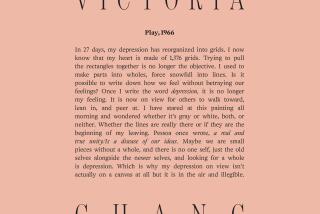The artful meditation of Karen Green, David Foster Wallaceâs widow
âBough Down,â the first book by artist Karen Green, arrives trailing a train of sorrow. Green was married to writer David Foster Wallace, who committed suicide in September 2008. He was 46. Green has surfaced intermittently since then, giving few interviews. In 2009, at an exhibit in South Pasadena, she showed a piece called âThe Forgiveness Machine,â a 7-foot-long device into which one placed a piece of paper inscribed with what you wanted forgiven; the paper emerged, shredded, from the other end of the machine. The exhibition, one of her first public appearances since her husbandâs death, was draining for Green, and she told an interviewer that she struggled to make it through. She never used the machine herself.
âBough Downâ is a book of prose poems interspersed with collages the size of a few postage stamps. Itâs not about forgiveness so much as the excruciating difficulty of living with someone terminally depressed and, after his death, the long, lonely aftermath. The book is mournful and a touch angry but also generous of heart and even, in rare moments, lightly comic. Throughout she enacts Audenâs definition of poetry: âthe clear expression of mixed feelings.â
She writes about finding Wallaceâs body hanging on their patio. âI worry I broke your kneecaps when I cut you down,â she says. âI keep hearing that sound.â
There are traces of him everywhere â a bag scented by his American Spirits, some leftover pills that she pops in desperate moments, the dogs he treasured. (Wallace reportedly considered giving up writing at one point and opening a dog shelter). His ashes sit âin a foil-wrapped box next to portraits of our moms, reflecting sunlight.â
âI keep your deodorant, which I use sparingly,â she writes. âI make a slimy mustache with it before I tuck in.â Thereâs something almost playful about that âslimy mustache,â as if she knows that this deodorant is an insufficient totem. Gooey and evanescent, one day itâll be gone.
That familiar smell may be a comfort, but Green finds that once-beautiful memories threaten to curdle: âItâs hard to remember tender things tenderly,â she says, regretfully.
A couple of years ago, Green told the Guardian that she had difficulty being âthe professional widow.â In âBough Down,â when forced to appear in public, she becomes âthe doppelganger widowâ and âshows up at the most prestigious service draped on the smartest and meanest support guy.â (The support guys are a clutch of unnamed friends, acquaintances, family, the sort of people who appear in the wake of a tragedy and whose visits become more fraught and less frequent.)
Eventually she forces herself to move, from Pomona to Northern California. Itâs fire season, a time when the sunset is painted â and who but a painter could come up with a description like this? â in âthe eye shadow palette of the apocalypse.â
âThere is the thing itself,â Green observes, âand then there is the predicament of its cavity.â This book doesnât fill that cavity (what can?). It only traces its contours â powerfully, gorgeously.
Silvermanâs work has appeared in the New York Times, Slate, the New Republic, and many other publications.
Bough Down
Karen Green
Siglio: 188 pp., $36
More to Read
Sign up for our Book Club newsletter
Get the latest news, events and more from the Los Angeles Times Book Club, and help us get L.A. reading and talking.
You may occasionally receive promotional content from the Los Angeles Times.








